China's rights lawyers willing to pay for progress
A few brave souls risk beatings and detention as they seek fairness for their clients … and country

What does it take to be a human rights lawyer in China? News emerging over the past months may shed some light.
In October, Tang Jitian , who had his practising licence revoked for his activism, was detained for five days on charges of "disturbing order in a workplace" in Jixi , Heilongjiang province.
Tang had tried to assist a woman held in a labour camp on suspicion of being a Falun Gong member. Alongside fellow lawyer Jiang Tianyong , Tang was placed on 15 days of administrative detention for "using cult activities to endanger society" on March 22, and was released on April 6 with reported signs of physical abuse.
Tang and Jiang were among four rights lawyers illegally held as they investigated the detention of Falun Gong members in Heilongjiang. One, Zhang Junjie, was released on March 27 after a five-day detention for "gambling". Zhang said the four were taken to a police station for individual questioning on March 21, during which he was repeatedly slapped on the face and had water poured over his head before being kicked and beaten, resulting in three broken ribs.
It all happened after Beijing announced in December the gradual abolition of the re-education-through-labour system, which allowed police to detain for up to three years without trial minor offenders as well as petitioners and activists.
To many activists, it signalled a new wave of repression against rights lawyers.